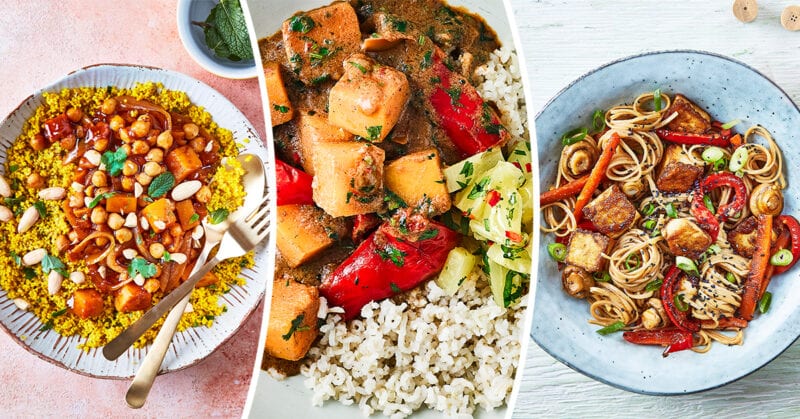How to be a healthy vegan

Being vegan is becoming more and more popular. In the last 10 years, the number of vegans in Britain has risen by a whopping 360%!
What is a vegan diet?
A vegan diet is basically one that is plant-based. Vegans do not eat meat, eggs, dairy, honey or any other animal products.

However, veganism isn’t only about diet. Full veganism means avoiding all products that involve animals, such as leather and wool clothing or products that have been developed with animal testing.
Is Being Vegan Healthy?
The health benefits of being vegan
There are a number of great health benefits to being vegan, which include lowering your risk of developing heart disease and diabetes (World Health Organisation). Vegans generally eat foods which are low in saturated fats, and high in fibre, vitamins and minerals – all of which contribute to better health.
The health risks of being vegan
If you don’t plan your vegan (or plant-based) diet properly, there’s a risk that you may become deficient in certain important nutrients, especially B12, but also protein, zinc, iron, omega 3 and calcium. This is because meat, fish and dairy are the main sources of these nutrients in most people’s diets.
How to be a healthy vegan
- Include protein with every meal. Nuts, seeds, pulses, quinoa and tempeh (fermented soya) are all good sources. Adults need between 45g and 55g of protein a day. Protein is essential for growth and repair. A 25g portion of almonds contains 5g of protein.

- Vitamin B12.B12 is essential for making red blood cells healthy and for nerve function. You need a daily intake of at least 1.5mcgs: if you’re low in B12 you can become anaemic. It’s found in yeast extract like Marmite or yeast flakes, fortified cereals and alternative milk products, but the most reliable way to make sure you get enough is to take a B12 supplement.
- Omega-3 rich foods. These have anti-inflammatory effects, are good for the immune system, have cholesterol lowering effects and help to keep the cells in our body healthy. Though they’re most commonly found in oily fish, there are a number of vegan sources, including walnuts, pumpkin seeds, sunflower seeds, chia seeds and flax seeds.
- Iron rich foods.Iron can be found in most green leafy vegetables and also in broccoli, chickpeas, lentils, kidney beans, sprouted beans, nuts and dried fruits. If you lack iron, your body can’t make enough healthy oxygen-carrying red blood cells, and a lack of these can lead to anaemia.

Vitamin C is required to absorb iron, so you need to make sure you get enough of this, too. Some good sources of vitamin C are red peppers, citrus fruits, tomatoes, kiwi, kale, strawberries and papaya.
- Calcium – essential for bones and teeth! Found in tofu, sesame seeds, kale, broccoli, oranges and fortified milk alternatives. Vitamin D is required to absorb calcium, but this can be difficult to get through diet – the best source is sunlight! Good sources of vitamin D are tofu, sesame seeds, fortified cereals and milk alternatives, but you may want to consider taking a vitamin D supplement in the winter.

- Zinc.Zinc is essential for wound healing, thyroid function, immune health and blood clotting. It’s found in brazil nuts, spinach, mushrooms, pumpkin seeds, pulses, tofu, walnuts, cashew nuts, flax seeds, wholemeal bread and quinoa.
A few practical tips on being vegan
Plan your meals… to ensure you’re getting a balanced diet, remembering to include all 6 of the nutrients listed above. Gousto now offer a good range of plant-based recipes which make it simple to cook delicious, varied plant-based recipes at home.
Take snacks with you… to work, or when you go out for the day, so you’re not caught short if you get peckish. It’s often difficult to find suitable vegan-friendly snacks; a few good options are: fruit with a few nuts, hummus with vegetable sticks, oat cakes with nut butter.

If you go to a restaurant… look at the menu first. This will help you to know what vegan options are available and what to ask for.
Avoid having too much sugar… and refined carbohydrates in your diet, such as white flour-based foods, sweets and cakes. These are low in nutrients and won’t keep you full for long!

 MENU
MENU CLOSE
CLOSE
